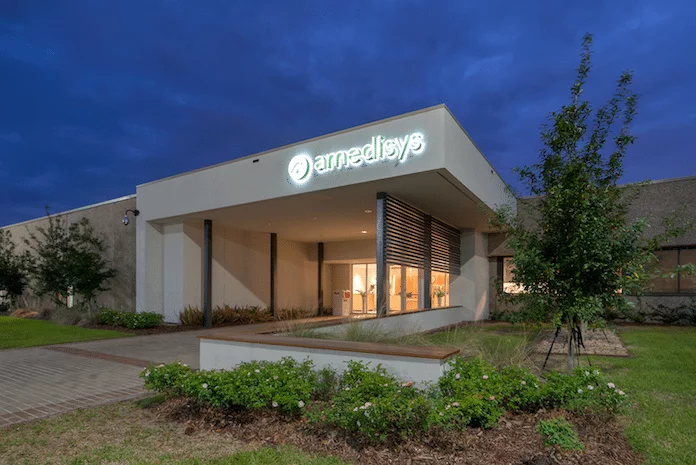Amedisys Inc. (Nasdaq: AMED) and Optum – the diversified health care services arm of UnitedHealth Group (NYSE: UNH) – have agreed to combine.
Under terms of the deal, announced early Monday, Optum will acquire the home health and hospice giant Amedisys in an all-cash transaction for $101 per share. That figure puts a roughly $3.3 billion price tag on Amedisys.
Optum previously made a bid to buy Amedisys in an all-cash transaction for $100 per share.
“The combination of Amedisys with Optum unites two organizations dedicated to providing compassionate, value-based comprehensive care to patients and their families,” Amedisys wrote in an announcement.
Baton Rouge, Louisiana-based Amedisys provides home health, hospice and higher-acuity care services across 522 locations in 37 states and the District of Columbia. The company’s net service revenue totaled $2.23 billion in 2022, a slight increase from the prior year’s total of $2.21 billion.
Prior to UnitedHealth Group’s Optum stepping into the picture, Amedisys had entered into an agreement to merge with Option Care Health (Nasdaq: OPCH). That deal, which would have been completed through a combination of cash and stock, valued Amedisys’ stock at $97.38 per share.
After agreeing to the deal with Optum, Amedisys will now be limited in exploring other options that may surface, a Monday filing with the U.S. Securities and Exchange Commission (SEC) notes.
“Amedisys has agreed not to, and to cause its affiliates and its and their representatives not to, solicit, initiate or knowingly encourage or take any other action to knowingly facilitate any third-party acquisition proposals,” the SEC filing states. “[And it] has agreed to certain restrictions on its and its affiliates’ and its and their representatives’ ability to respond to any such proposals.”
Amedisys and Optum expect the transaction to close in 2024, Amedisys wrote in an email to referral sources. It does not expect any disruptions to patient care as part of the deal.
“Optum is one of the largest health care services providers in the world, and this combination will unite two companies focused on providing comprehensive care to patients and their families,” the email reads. “Together, we will have the ability to impact change more than any other services provider, offering more services that can be integrated into the home to increase clinical care and experience for patients.”
Option Care Health responds
Leaders from Option Care Health and Amedisys had described their previous merger plans as a way to build a complete, end-to-end home-based health solutions business. Combined, the companies also believed their diversified payer mix would have been highly complementary.
Bannockburn, Illinois-based Option Care Health delivers home and alternate-site infusion services across the U.S.
“This is an exciting combination, and one which positions us to create a leading independent platform for home and alternate site care,” Option Care Health President and CEO John C. Rademacher said on May 3. “Through this transaction, we are bringing together Amedisys’ home health, hospice, palliative and high-acuity care services, with the Option Care Health complementary home and alternate site infusion services.”
While some analysts were quick to point out the transaction’s long-term value, others raised questions about the value coming back to Amedisys shareholders as well as Option Care Health’s timing, with home health reimbursement cuts on the horizon.
When Amedisys revealed it had received a bid from Optum, there was widespread anticipation the home health provider would change course.
“Given this was the offer with the higher price tag [near-term] (not considering long-term value creation and positive stock movement w/ OPCH), the final result doesn’t come as a surprise,” an analyst note from Jefferies reads.
With its transaction denied, Option Care Health is now owed a $106 million termination fee, which the company plans to put toward its established capital allocation strategy.
Rademacher said in a Monday statement that Option Care Health is “disappointed” in the Amedisys outcome. Moving forward, the company will continue to explore ways of creating value for shareholders and key stakeholders, he added.
“Option Care Health benefits from a leading platform in home and alternate site infusion services and a proven track record of execution,” Rademacher said. “We remain confident in our growth trajectory, which is underpinned by current industry trends and market forces as well as our strong financial position.”
The new challenge
The challenge for Optum and Amedisys now becomes clearing regulatory review, which will likely include multiple rounds of scrutiny from the Federal Trade Commission (FTC).
Optum closed a $5.4 billion acquisition of another home health and hospice titan, LHC Group, in February. That deal, originally announced in March 2022, went through a rigorous review process, with FTC requesting more information last summer before reportedly looking into vertical harm theory concerns at the start of 2023.
If they were both under Optum, a combined Amedisys-LHC Group home health business would capture an industry market share of about 10%.
“If you’re looking into the crystal ball, based on other recent areas in health care that we’ve seen the FTC take some action, there’s definitely some potential for increased scrutiny,” Tyler Giesting, a director at West Monroe, recently told Home Health Care News.
One factor that falls in Optum’s favor: There’s “fairly minimal overlap” between LHC Group’s geographic presence and the footprint of Amedisys, the Jefferies note highlights.
“We think this deal will get a second request given the government’s recent focus on UNH’s acquisition history (i.e., LHCG), and we could see potential divestitures in a few select markets,” it reads. “Altogether, we still believe there’s little anti-trust risk associated with this transaction, especially given AMED’s sub-10% market share.”
If Optum isn’t able to acquire Amedisys due to antitrust issues or similar regulatory concerns, UnitedHealth Group will be required to pay Amedisys a fee of $144 million, the SEC filing states.




